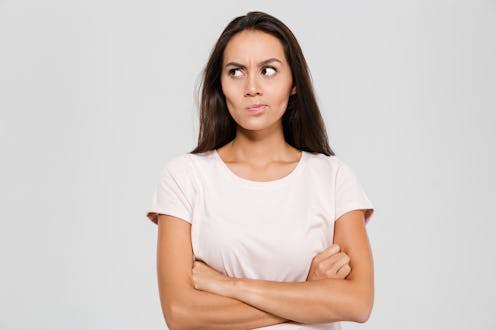One of the best ways to learn more about yourself and what's best for you is to determine what type of personality you have. There are lots of different ways to do this, but one really thorough and easy way to figure it out is to take a personality test like the Enneagram test to figure out your personality type. Once you know what your type is, you can learn so much more about yourself, like what kind of dog you should have, and what kind of job you'd be the happiest doing. Your type can also clue you in on what Enneagram types you're compatible with — or, what types you're not compatible with. Fun fact: No matter what type yours is out of the nine possible types, you're probably pretty compatible with the other eight. However, you're probably not that compatible with anyone who is your type — and the reason is pretty interesting.
First, though, you need to determine what your type is, and you can only do this by actually taking the Enneagram test through the Enneagram Institute. The Enneagram test is one of the most popular personality tests online right now, probably because it's surprisingly accurate. The test gives you your basic personality type, the type you were born with. As the official website says, "We are born with a dominant type." This dominant type is a huge part of what shapes your childhood, making you who you are today.
The test can be a bit intimidating. Results include nine different types and 27 different subtypes. That's a lot! At the same time, it can also feel a bit vague. The official website says that most people can end up identifying with several different types, and not just the one they've been defined as. The Enneagram User Guide says, "The accuracy of the enneagram types depends to a great deal on how well the user of the model can interpret the elements of the model." Basically, this means that the accuracy can depend on how you read your results.
All of that being said, there's still a lot you can learn from knowing your Enneagram type, especially if it feels exactly on point to you. But why wouldn't you be able to bond with people who are also your type, if you're supposedly similar to them?
First things first: Just because you share a type with someone doesn't mean you're doomed. According to The Enneagram Institute, "No pairing of types is particularly blessed and no pairing is particularly doomed." So, basically, any type could be compatible with any other type. The Enneagram Institute also says, "Keep in mind that one can have a relationship with any type if the two people are healthy. Since that is not always the case, knowing the type, the level of health, and the instincts of each person can provide more insight."
This might sound frustratingly vague, but I actually think it's kind of refreshing to hear something that honest — and it's true! Who you get along with the best is based on so many different factors, not just the results of a personality test. The Enneagram Institute also goes very in depth on the strengths and weaknesses of every type combination, if you're interested in learning the specifics.
Still, there is one type you might struggle with more than others, and that's your own type. Some research has found that "same Enneagram personality type marriages occurred two times less often than statistically expected." Why? As it turns out, the popular saying that opposites attract is mostly true in this case. Types tend to be more compatible with a type that is quite different from their own. Two different personality types are more likely to balance each other out in positive ways.
One exception to that rule is that "double-4 marriages, the only double-type pair to occur more often than chance." Why is that? According to The Enneagram Institute, "Fours often feel misunderstood, yet feel a special bond of understanding with other Fours." They are both unique, encouraging, and romantic, and they can develop deep friendships and passionate relationships.
So, if you want to use your Enneagram type to figure out who to date or become friendly with, you might want to go with someone a little bit different from you.
